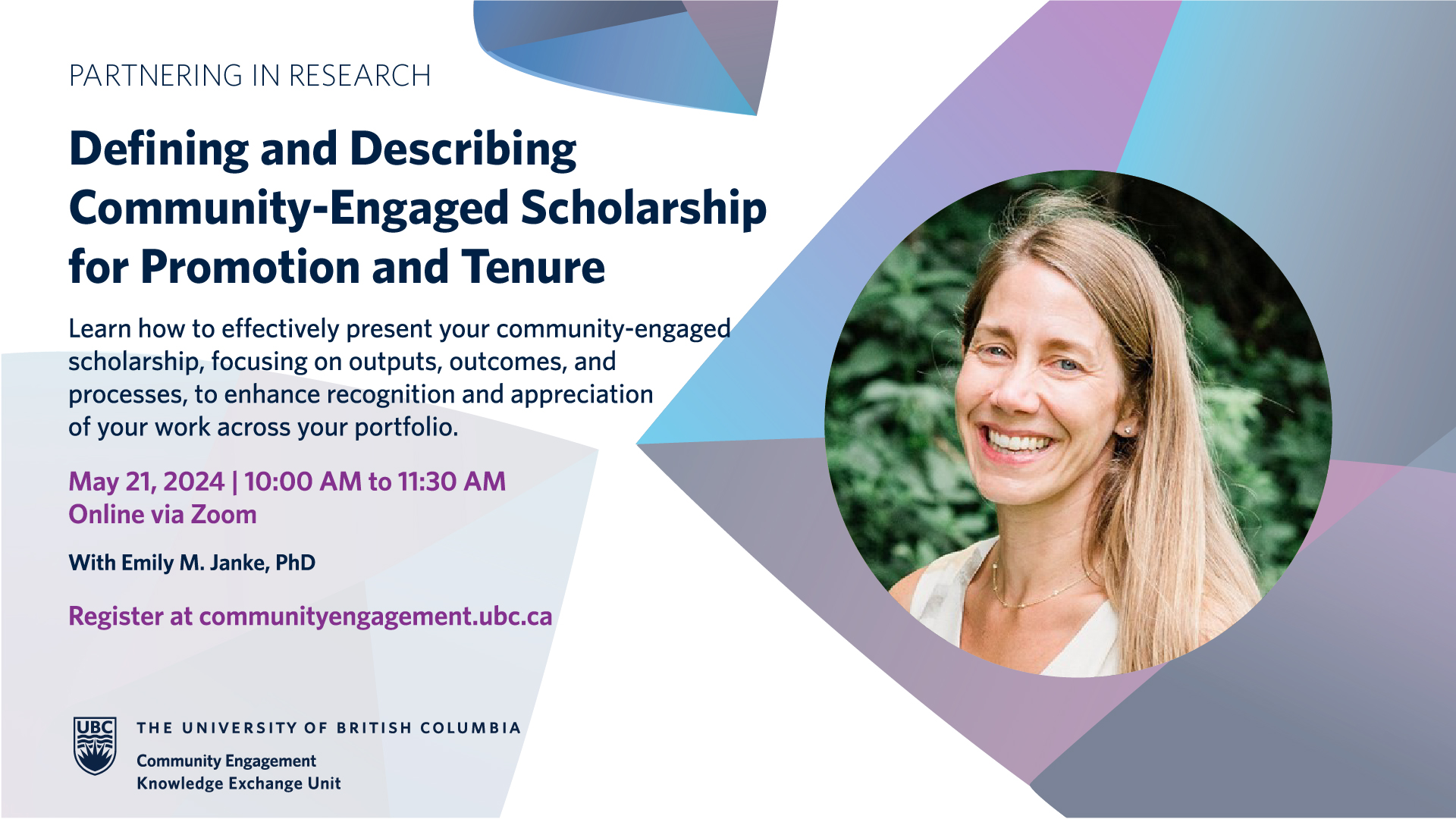Date & Time
Location
Organizer

Event details
Tenure track can be a daunting road for scholars who practice engaged research methods. Traditional Promotion and Tenure (P&T) policies often do not adequately recognize or value community-engaged scholarship (CES) as an essential aspect of academic work. Recognition of relationship-building, a core characteristic of CES, is lacking in traditional P&T policies. CES centers community knowledge, yet traditional academic measures often exclude diverse epistemologies.
In this workshop, participants will learn how to define and describe their community-engaged scholarship for P&T using three characterizations: outputs, outcomes and processes. In doing so, they will better their chances at having CES understood and valued across their portfolio.
Date: Tuesday, May 21, 2024
Time: 10:00 am to 11:30 am
Location: Online via Zoom
Cost: Free
Learning Objectives
- Describe key characteristics and values of community-engaged scholarship that distinguish it from other forms of public serving scholarship
- Identify measures for describing community-engaged scholarship so that others can understand the outputs, outcomes, and processes required for high quality scholarship
- Develop their own narrative template for communicating their scholarship for faculty recognition and rewards
Speaker
Emily M. Janke, PhD, has served as the inaugural director of the Institute for Community & Economic Engagement since 2010 at the University of North Carolina at Greensboro. She is a tenured full professor in the Peace and Conflict Studies department where she contributes to its community-engaged scholarship through teaching, research, and service. As a scholar-administrator, Emily has advanced practice and scholarship in the areas of interdisciplinary and transdisciplinary scholarship with diverse and inclusive teams; the equitable treatment of community-engaged scholarship in workload, hiring, and promotion and tenure policy and practices; strategic efforts to track and monitor community engagement and public service within and across institutions; pluralistic and open scholarly communications; resident-level community boards to support respectful institutional engagement; and the use of restorative practices in interpersonal, intergroup, and organizational culture.
Emily is a senior advisor for Community Engagement at the American Council on Education and the Carnegie Foundation, and is co-chair of the 2026 Carnegie Community Engagement Classification Revision Committee. She was inducted into the Academy of Community Engagement Scholars in 2021 and was a senior fellow for Duke University’s Office of Civic and Community Engagement in the Office of Durham and Community Affairs. She has been honored to receive the Barbara A. Holland Scholar-Administrator Award given by the Coalition of Urban and Metropolitan Universities, the Civic Engagement Professional of the Year Award given by the North Carolina Campus Compact, the Early Career Researcher award and the Dissertation Award given by the International Association for Research on Service-Learning and Community Engagement, and the John Saltmarsh Award for Emerging Leaders in Civic Engagement given by American Association of State Colleges and Universities’ American Democracy Project. She is a co-author of Collaboratory®, a publicly searchable, online database of community engagement activities within and across institutions of higher education. She has served on the Carnegie Foundation’s Community Engagement Elective Classification National Advisory Council since 2014 and is on the editorial boards of the Michigan Journal of Community Service Learning, the Metropolitan Universities Journal, and the Journal of Higher Education Outreach and Engagement. She enjoys collaborating with a variety of scholars (inclusively defined) to re-imagine the future of community engagement in higher education so that it is more inclusive, impactful, restorative, and just.